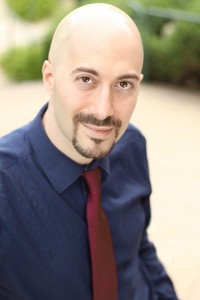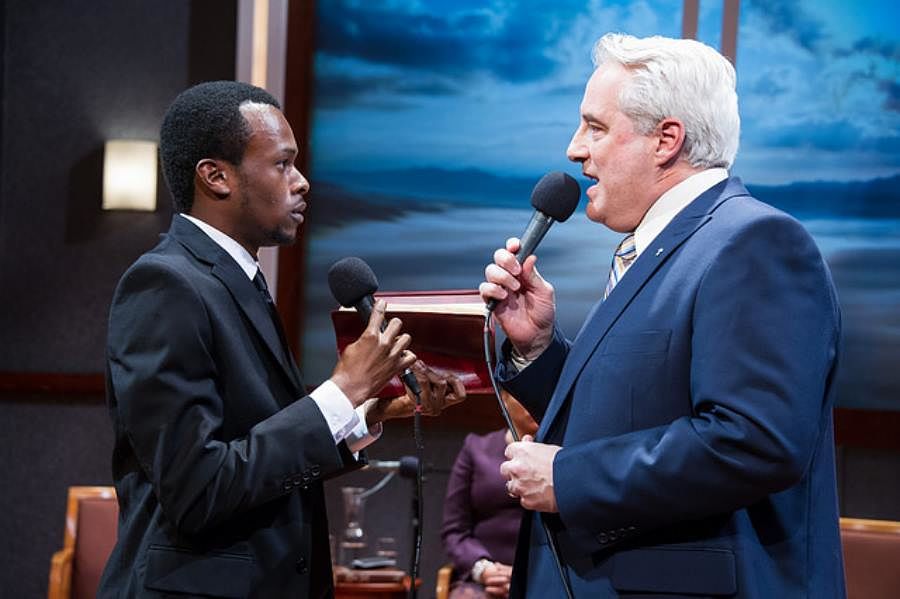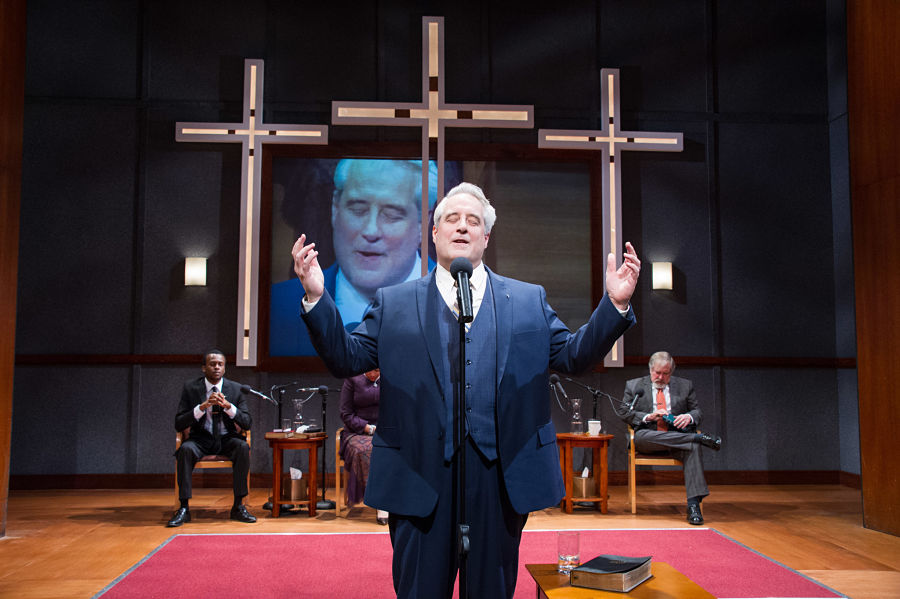Washington, D.C.’s Jewish Community Center is looking a lot like a megachurch these days. That’s because Theater J, the city’s and the nation’s preeminent Jewish theatre company, is staging Lucas Hnath’s searching drama The Christians there, Nov. 16-Dec. 11. It’s a striking choice for the company, which, though it often stages works outside its specific culture (David Henry Hwang’s Yellow Face, Stephen Karam’s Sons of the Prophet, Dan O’Brien’s The Body of an American, Tanya Barfield’s The Call), isn’t a place you’d typically go to hear gospel music belted and sermons preached.
But Hnath’s play is no altar call, and Theater J is not having a come-to-Jesus moment. Instead, in exploring a rift between its chief pastor and his congregation over theology, management, and meaning, it delves deep into human issues and conflicts that transcend religious disputation. When I spoke to Adam Immerwahr, Theater J’s relatively new artistic director, about how a play like The Christians fits the mission of Jewish theatre, he was fortuitously on his way to direct A Christmas Carol at his old stomping grounds, McCarter Theatre Center in Princeton, N.J.
Seems like there’s a lot of Christ on your theatrical dance card right now.
I know, I’m having a clash of religions.
It reminds of what the composer Michael Friedman told me when he was working on Saved and the Civilians’ This Beautiful City, their show about evangelical Christians. He was like, “This is a lot a Jesus for a nice Jewish boy.”
And Michael is composing the music for this Christmas Carol. It’s an all-new version to replace one that’s been running at the McCarter for 17 years. David Thompson is readapting it. Dan Ostling is doing the set design. It’s going to be amazing, if I don’t totally screw it up. But yeah, I’ve been working that Amtrak.
Do you go on the quiet car?
No, I need to make phone calls—it’s like my office. I advise people to find out which car I’m on and avoid it.
So the inevitable question: Why The Christians at Theater J?
Historically Theater J has had an extraordinarily wide diversity of work, but the stated mission has actually shifted since I arrived. To me it’s really critical that each of the projects we do connects with or resonates with the Jewish experience. Whether or not it’s legibly Jewish, it should be clear after you’ve seen it why it’s at a Jewish theatre, even if it wasn’t when you went in.
I’m fascinated about the idea of a culturally specific theatre doing works outside its ostensible tradition, but infused with that point of view.
Yeah, let me riff on that for a second. When you think about the National Asian American Theatre Company doing Clifford Odets, or Yiddish-speaking theatres doing Death of a Salesman in Yiddish, you open up these interesting questions about culture and cultural translation. There’s always been this interesting cross-pollination that I think culturally specific theatres should delve into and embrace.
One of the questions for Theater J is, What does it mean to be a Jewish theatre? It’s not true that all authors are Jewish, or that all the actors or the audience are Jewish. So where, between the audience and stage, does that Jewish lens sit?
When I really think about The Christians, I’m starting to get it, but fill that in for me.
Well, I certainly know that when I watch The Christians, I think about synagogues I’ve attended. I think of those both as houses of worship and as business entities. My synagogue was split into two when I was a kid. I’ve been joking that it’s the most Jewish play of our season.

Okay, explain that.
First of all, it’s a play that is fundamentally about faith and belief, and that happens in the context of a religious service. It’s a play about how religion can bring us together or pull us apart. It’s built around a deep questioning of scripture, which is the most Jewish tradition you can find—there have been literally generations of scholars studying and debating the Torah. The discussions that take place in The Christians seem positively rabbinical. So it connects on a deep and fundamental level with questions that Jewish people are always asking.
So you’re creating a sort of megachurch within the JCC? Tell me about that.
Just as we do when we do a Jewish play, even if the actors and the director aren’t Jewish, we want to capture the culture as authentically as possible, and to be as nuanced and as respectful in how we capture this as Lucas is in his script. So the design that Jonathan Dahm Robertson has created for the space really embraces the architecture of Theater J’s auditorium; it feels like it expands our space, and allows you to feel like it’s a megachurch. And we’re using live video, as many of these churches do. Lucas has imagined the play as delivered entirely into microphones, delivering specific emotions in the almost microscopic way that a microphone allows you to do; with the video, we’re both hearing it and seeing it on an amplified level. And yes, the set features a Calvary cross; we’re not shying away from the fact that it’s a church. We’re not hiding that we’re doing a play called The Christians.
What’s the response been like?
In general the community has been thrilled; there’s as much excitement about this title as any in our season. One or two people have said, “Wait, what?” When it’s explained to them, though, they say, “Cool.” We do a lot of work that is very often intellectual, sometimes provocative, and this fits rights in. Interestingly, it’s also the most Greek play of the season, structurally. It’s got a chorus; it consists of an argument, then a decree, then a decision, then appeals to that decision.
Lucas told me it’s modeled on Antigone, which I hadn’t noticed.
I think it’s helpful to think about it within a tragic structure, even though no one dies—there’s not blood all over the stage. The play has good bones because they are from Greek tragedy.

So the big theological dispute in the play is over the existence of hell, essentially. Is that specifically a debate that resonates with analogous ones in Judaism?
Anything I say about Judaism will be incorrect to at least half of the people who read this; I’m not a theologian. I think the thing that will resonate the most with our Jewish audience is the discourse of the play. I have been to several synagogues in the D.C. area where I’ve heard a drash, or a sermon, which is followed by a lively debate. At one synagogue I know, they don’t even wait till the rabbi is finished before they have the debate. And this isn’t Jews behaving badly; this is part of how we do Judaism. We wrestle, we struggle for meaning, for how to make sense of this ancient religion in the modern world. So that action is so familiar to so many in the Theatre J community. My only question is, Will the discourse be so familiar that it loses some of the surprise value it might have for other audiences?
Leaving aside the specific question of hell, it’s fair to say that there are faultlines in Judaism between conservative and liberal interpretations of scripture, as there are in Christianity, right?
For instance, over the last decade or two, houses of worship from all over the country have had to grapple with gay marriage and change their beliefs about it. Those issues are alive today. There’s a conservative synagogue in D.C. where the rabbi will absolutely marry two people of the same sex as long—as they’re Jewish. He won’t do interfaith marriages. So from time to time, our beliefs change; we now believe that marriage includes two people of the same sex. That’s an earth-shattering change of belief, and it’s happened in our lifetimes. So the question of how our beliefs come to exist, how our interpretations of God’s communication to us shifts in connection with the historical moment we’re in, feels relevant to every person.
Another level the play works on is organizational; I think it was Les Waters, the original director, who said he thinks it’s a play about being an artistic director.
The question of how you lead an institution, how you balance the mission and the financial realities of an institution, and how you make sure the key stakeholders are on your side—these are questions that every religious institution faces, and every arts organization faces.
I wonder if anyone in your audience will feel like the play’s ousting-of-a-leader story resonates with what happened when Ari Roth, your predecessor, and Theater J’s board fell out.
That moment in Theater J’s history is now nearly 2 years ago. Most in the audience are looking at where we are now, at what conversation we’re having, and what our role is becoming as the nation’s largest, most prominent Jewish theatre. They’re looking with interest to see what my take on that is. The conversation about Ari’s leadership has happened, and now he’s running his own theatre, Mosaic, and doing extraordinary work. Everyone’s landed on their feet, and now we have two theatres where there was one.
This is kind of a devil’s advocate question about your mission: What do you feel your role is, as a culturally specific theatre for a culture that is, shall we say, hardly invisible on our stages?
It’s something I’ve grappled with. There are other culturally specific groups that present the work of groups that have been historically underrepresented in the American theatre, and you’re right—you couldn’t say that people of Jewish heritage are historically underrepresented in the American theatre. That would be ludicrous. But there are a batch of plays, particularly now, that many theatres feel are “too Jewish”—it’s not about the identity of the authors, it’s about the topic. We’re the one place where we can guarantee your play is not too Jewish for our audience. We’re doing Arthur Miller’s Broken Glass, a terrific play, and it’s among the most Jewish plays you can find. We should be the place that does kind of work.
We will always struggle and wrestle with what kind of conversations we should be having from a uniquely Jewish perspective, what it means to be Jewish, and what it means to be a Jewish theatre. We seek to expand that every day. So we’re doing The Christians.


